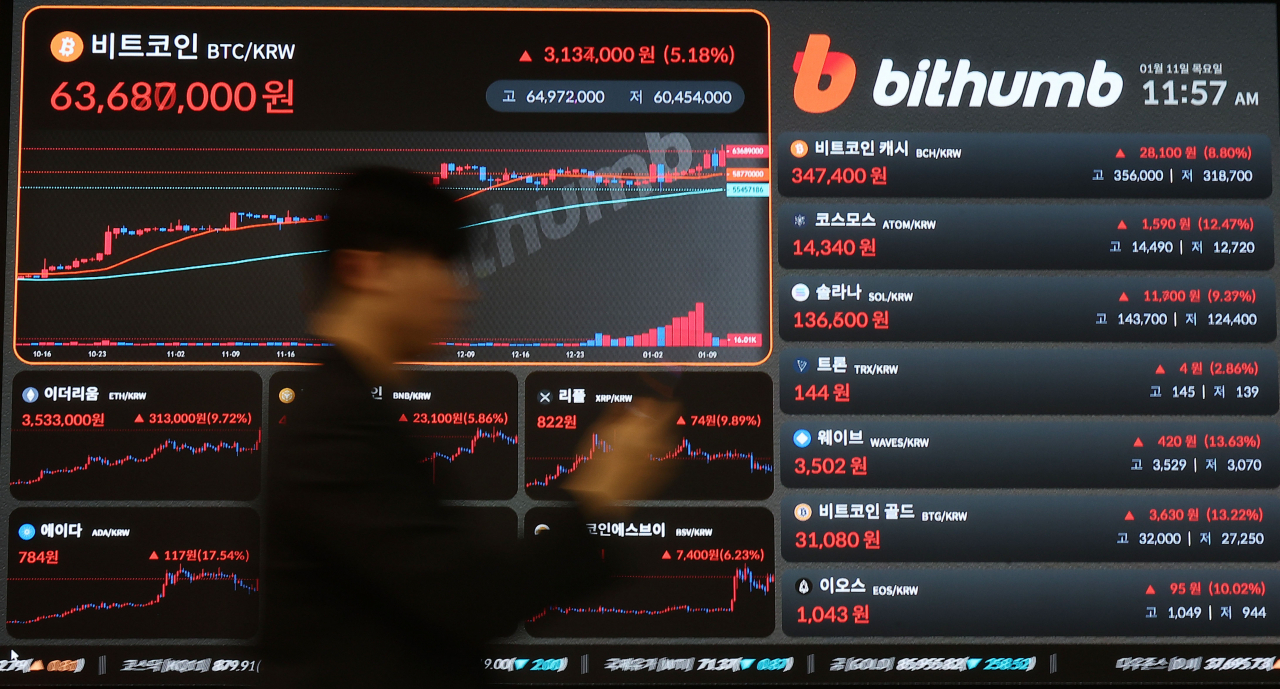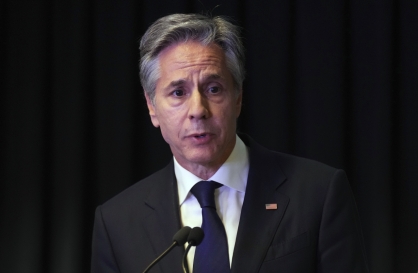 |
An electronic board shows the prices of cryptocurrencies at crypto exchange Bithumb's customer center in southern Seoul on Jan. 11, shortly after the US Securities and Exchange Commission announced authorization for trading equity-traded funds tied to bitcoin. (Yonhap) |
Local authorities' decision to keep the doors shut for exchange-traded funds linked to the price of bitcoin has led to concerns that Korea may be left behind by changing global financial trends.
While the US Securities and Exchange Commission’s authorization of spot bitcoin ETFs represented a milestone long in the works for the virtual assets market, the financial product remains off limits for Korean investors, as local authorities announced the trading of related products for local securities firms could be considered illegal.
"Brokering spot ETFs could go against the government's stance and the Capital Market Act. The law does not consider virtual assets to be an underlying asset, as it is not defined as a financial product,” Financial Services Commission Vice Chairman Kim So-young said in a briefing Tuesday.
Trading ETFs linked to the future price of bitcoin is allowed, but spot ETFs are not currently allowed in Korea, the financial watchdog explained.
“If financial service providers own virtual assets, which are associated with high volatility, their stability could be jeopardized,” Kim said.
Reasonable and appropriate pricing is an important factor of an underlying asset, Lee Hyo-seob, a senior research fellow at the Korea Capital Market Institute, said.
“While bitcoin futures are listed on the Chicago Mercantile Exchange, bitcoin itself is only traded through unauthorized exchanges, making it impossible for it to be an underlying asset under the current law,” Lee said.
Fear of missing out
Market experts project the US’ approval of bitcoin ETFs to attract massive investment funds. The 10 spot bitcoin ETFs that have been listed on US bourses notched a combined trading volume of roughly $10 billion in their first three days on the market.##
Standard Chartered further projected spot bitcoin ETFs could attract inflows of $50 billion-$100 billion this year in a report issued on Jan. 8.
This could lead to Korean investors missing out on the lucrative market.
As Korean investors have to trade through local brokerage firms when investing in overseas stocks or financial products, they will not be able to invest in spot bitcoin ETFs through any means for the time being.
Yet investors’ demand for crypto-tied financial products remains high. Samsung Asset Management said Monday the assets under management for its future bitcoin ETF product, listed in Hong Kong, stood at $10.4 million, marking a fourfold increase in a year.
The surge reflects investors' growing interest in crypto-related assets, while still hedging risks, the company assessed.
Regulations on the way?
Despite high public interest in cryptocurrency, the local virtual asset market still lacks detailed guidelines, making its legal status ambiguous.
Though local securities firms including Mirae Asset Securities previously brokered spot bitcoin ETFs listed in Canada and Germany, they shut off further transactions after the FSC's announcement on Jan. 12.
KB Securities even flip-flopped in its stance over ETFs linked to futures of other cryptocurrencies, shutting down new transactions and later allowing them again, as it was unsure about local authorities’ guidelines.
Experts are keeping an eye on whether the recent controversy could boost the introduction of related laws here.
Korea is currently working out how to regulate virtual assets. It has regulations coming on the way such as levying taxes on virtual assets from January 2025 and the introduction of the Act on the Protection of Virtual Asset Users in July.
“There needs to be a consideration of the reform of the current law. It is ironic because the spot bitcoin ETFs are relatively more stable compared to the future ETFs. From the perspective of investor protection, allowing spot bitcoin ETFs is more reasonable," Lee from the Korea Capital Market Institute said.
The crypto industry views that the local financial market will have to embrace cryptocurrencies as an underlying asset in the future.
“It may take some time for approval on spot bitcoin ETFs to come, but it will happen in the future for sure. It is just a matter of time,” an official from a local crypto exchange said.







![[Weekender] How DDP emerged as an icon of Seoul](http://res.heraldm.com/phpwas/restmb_idxmake.php?idx=644&simg=/content/image/2024/04/25/20240425050915_0.jpg)